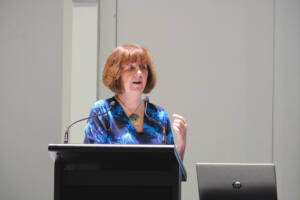
WelCom August 2024
Michael Fitzsimons
More than 700 educators and people involved with Catholic education gathered for the National Catholic Education Convention in Wellington in June.
The theme of the convention was Tūhono Whakapono: Together, one faith community. It was the first convention to be held since 2018, due to the intervention of the Covid-19 pandemic.
The convention included 23 seminars and featured several keynote speakers, including Dr Joe Paprocki, author and the National Consultant for Faith Formation for Loyola Press, USA, Manuel Beasley, Vicar for Māori in the Auckland Diocese, Tim Wilson, Executive Director of the Maxim Institute and Dr Sandra Cullen, Associate Professor of Religious Education and Head of the School of Human Development at Dublin City University, Ireland.
‘It was a fantastic conference,’ said Sandra Cullen. ‘I loved the commitment of the people and the warm welcome. I came to the conference following a bereavement, and I was carried along by these great people. I really felt at home and cared for by the people.’
Sandra Cullen’s keynote address was entitled We teach who we are – drawing on the curriculum as a source of wisdom for ourselves. Her message was that, at the heart of the curriculum is the storyteller.
‘Supporting the storytellers, the teachers and leaders, is key to the success of the curriculum. The cross-themes of the curriculum are potentially key sources of wisdom for the lives of the storytellers so that as we “teach who we are”, we do so with integrity and authenticity.’
One of the things which is important in a Catholic worldview is learning to hope, not just hope for me but hope for the world,’ said Dr Sandra Cullen at the NZ National Catholic Education Convention.
Sandra Cullen works with many parishes and schools and believes that educators need to get beneath the holy words and constructs and look at what underpins that.
‘We need to try and reach people who maybe feel a bit alienated from the official church and liturgy, which doesn’t always speak to them. They may feel lost. We need to help people to get underneath that to their experience of life and wonder and meaning and love and to see that God is within all of that.
‘Sometimes you can’t see it but sometimes you can. There are moments when we get that underpinning of existence that we in the Catholic tradition call God, and a light gets shone and we see that.’
It’s important to allow young people to interrogate their experience, to ask the tough questions and they may not use the same words we would in their responses, says Sandra.
‘My own children, for example, would express themselves through music and poetry and art. They might not use the same language that I use but I think we are trying to express the same longings.’
One of the things which is important in a Catholic worldview is ‘learning to hope, not just hope for me but hope for the world,’ says Sandra.
‘Hope is not about this lovely fairyland after we die. It’s the idea that there is a plan to the universe, that ultimately we are in God’s hands. This is something which is so valuable in today’s conflicted world that is flattening all horizons.’